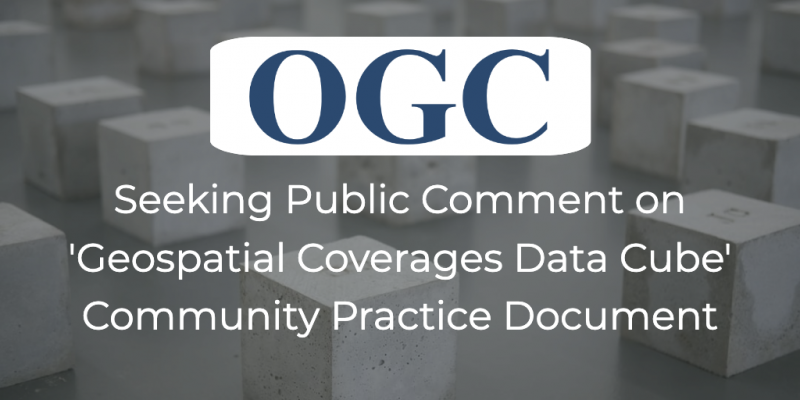By documenting real-world community practices behind Geospatial Data Cubes the document aims to promote coordination and common terminology that could lead to federated Geospatial Data Cube Services

The Open Geospatial Consortium (OGC) seeks public comment on the Geospatial Coverages Data Cube Community Practice document.
Data Cubes for geospatial information provide the means to integrate observations and other types of geospatial data for use in multiple applications through simplified access and efficient analytics. Using the geospatial ‘Coverages' (e.g. rasters and imagery) data structure, the Community Practice document defines requirements for a geospatial coverages data cube infrastructure and guidelines for enhancements and extensions to the basic core.
A Data Cube is a multi-dimensional (“n-D”) array of values. Even though it is called a “cube,” it can be 1-dimensional, 2-dimensional, 3-dimensional, or higher-dimensional. The dimensions may be coordinates or enumerations, e.g. categories. A Geospatial Coverage Data Cube is a Data Cube established on the basis of the Geospatial Coverage standard with a grid system for data with one or more coordinate dimensions for space and time.
The document captures effective practices for Geospatial Data Cubes based on several communities that have implemented and are running operational geospatial data cubes. The objective of the document is to promote coordination and common terminology that could lead to federated Geospatial Data Cubes Services.
The candidate Geospatial Coverages Data Cube Community Practice document is available for review and comment on the OGC Portal. Comments are due by 19th September 2019 and should be submitted via the method outlined on the candidate Geospatial Coverages Data Cube Community Practice document request page.
About OGC
The Open Geospatial Consortium (OGC) is an international consortium of more than 530 businesses, government agencies, research organizations, and universities driven to make geospatial (location) information and services FAIR – Findable, Accessible, Interoperable, and Reusable.
OGC's member-driven consensus process creates royalty free, publicly available geospatial standards. Existing at the cutting edge, OGC actively analyzes and anticipates emerging tech trends, and runs an agile, collaborative Research and Development (R&D) lab that builds and tests innovative prototype solutions to members' use cases.
OGC members together form a global forum of experts and communities that use location to connect people with technology and improve decision-making at all levels. OGC is committed to creating a sustainable future for us, our children, and future generations.
Visit ogc.org for more info on our work.
“






